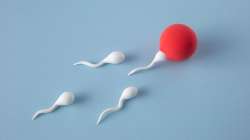Men's Biological Clock is Ticking Too: 5 complications that men face as they age
It is crucial to look after the reproductive health of both partners when you or your partner are over 30 and wish to have or start a family. If you are unsuccessful in conceiving, both partners should undergo testing concurrently.

A biological clock is defined technically as an individual’s natural timing device for physiological processes of the body. When someone mentions, "Your biological clock is ticking," it typically implies that you may be reaching an age where getting pregnant becomes increasingly challenging. This statement mainly addresses women because it is well known that having a healthy pregnancy becomes increasingly difficult as a woman's age progresses. However, recently, it has been discovered that a man's age might also play a key role in governing a couple’s fertility potential.
Biological clock and its significance for men
According to Dr Plabani Sarkar, Reproductive Medicine Specialist, Milann Fertility & Birthing Hospital, H.S.R Layout, Bangalore, with the development of technology and our growing understanding of the human reproductive system, reproductive scientists and physicians now concur that even males have a biological clock that is ticking away. The discussion of the "ticking biological clock" has so far largely ignored men because of their capability to produce sperm even at the age of 70. However, the quality of such sperm and their fertility potential is what has been put into question in recent times.
Complications of ageing
The effects of ageing on conception and pregnancy are known to most women, but men remain largely unaware of the impact their age might have on pregnancy. The implications of the male biological clock or age on pregnancy are multifaceted and extend beyond the commonly discussed impact of maternal age. Listed below are some of the complications that men face as they age:
Low testosterone levels and sperm count: As men age, a notable consequence is a decline in testosterone levels, leading to a reduction in sperm count.
Poor sperm quality and motility: Ageing also adversely affects sperm quality and motility, making it challenging for them to navigate the fallopian tubes and successfully fertilise the egg.
Increased Risk of Miscarriage or Stillbirth: Diminished overall sperm health in older men increases the likelihood of miscarriage or stillbirth, underscoring the importance of considering paternal age in reproductive health discussions.
DNA Fragmentation and Damage: With age, DNA fragmentation in sperm becomes more pronounced, particularly in men over 40, impacting the health of the sperm and increasing the chances of miscarriage when DNA damage exceeds 40%.
Men require fertility testing too
When natural attempts at conception fail, men are far less likely to consult a doctor. However, according to current evidence, the male partner must also get tested. Testing is the only method to find out if a man's sperm health is adequate for a healthy pregnancy or if his biological clock is running out too. It is similar to the fertility tests that women undertake to determine the quantity and calibre of eggs they produce. Therefore, both partners must get their tests done to delineate the exact reasons behind their inability to conceive and where they stand in terms of their reproductive health.
All things considered
Issues associated with pregnancy and age are no longer exclusive to women. Therefore, men must also think about getting their sperm counts, motility, and morphology examined by a semen analysis which is a fairly simple test. You should also think about freezing and preserving your sperm if you're in your 30s and want to maintain your reproductive potential for later use.
ALSO READ: 6 things to do if you are not able to conceive| Expert Tips